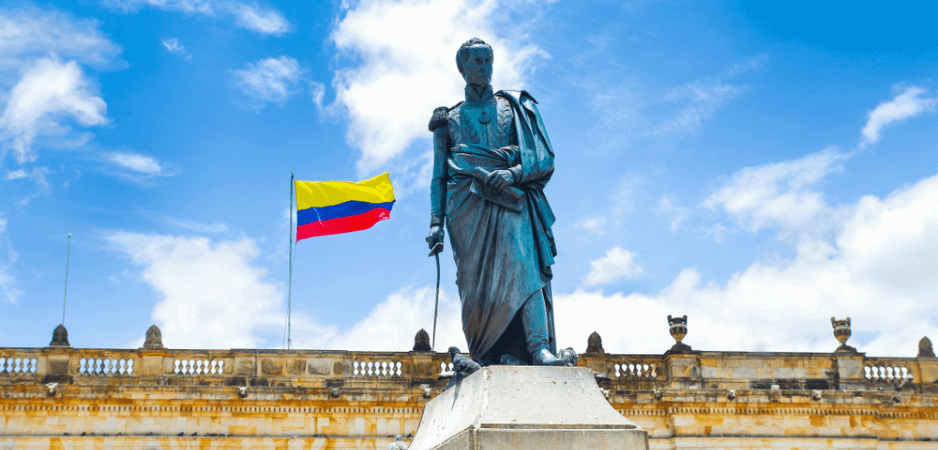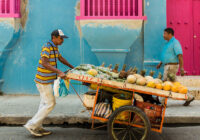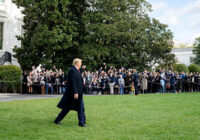Given that all three centrist candidates failed to secure a place in the second round of Colombia’s presidential election, right-wing Ivan Duque is best positioned to form a broad coalition.
Back in January, I wrote an article for Fair Observer in the run up to the presidential in election in Colombia titled “Will Colombia’s Next President Overcome the Challenges of Peace?” In it, I argued that the controversial peace deal with the Revolutionary Armed Forces of Colombia (FARC) signed by President Juan Manuel Santos would be the determining factor of the 2018 presidential election. Likewise, I wrote that former Vice-President German Vargas Lleras would successfully manage to occupy the country’s right-wing political space and win the presidency given the young age and relative inexperience of then-Senator Ivan Duque.
Back then, Duque, of the Democratic Center Party, had just been elected candidate of a right-wing coalition. However, even Duque’s political godfather, former President Alvaro Uribe, seemed to be skeptical about his prospects and had met on several occasions with Vargas Lleras. Nevertheless, this particular scenario did not play out. Duque’s successful incarnation of the Colombian hard-right forced Vargas Lleras to embrace a center-right position, ending up in fourth place during last Sunday’s first electoral round.
Without a doubt, the first round of Colombia’s presidential election on May 27 demonstrates the unmatched power and influence of former President Uribe on the national political scene. Eight years after his presidency, now-Senator Uribe is still the most powerful individual in the Colombian political scene. He had led a successful campaign against the original terms of the 2016 peace accord with the FARC. More recently, Uribe transformed a junior senator, Ivan Duque, into the leading candidate for Colombia’s presidency in the second electoral round to be held on June 17.
After months of climbing in the polls, particularly in recent weeks, it should not be surprising that Duque, representing Colombia’s hard right, is the leading candidate in the runoff. Even though some of his followers were hoping that Duque would be elected in the first round, which would have required him obtaining over 50% of the vote, the wide spectrum of five major candidates makes this feat nearly impossible.
On the other hand, facing Duque’s right-wing coalition is Gustavo Petro, who represents Colombia’s hard left. A former member of M19, a guerrilla group that demobilized during the 1990s, Petro has risen to become Colombia’s most prominent left-wing political figure. Though Petro remains profoundly unpopular with large sectors of the population given his personal background and poor performance as mayor of Bogotá, the era ushered into Colombia by the peace deal with the FARC is opening up new political possibilities.
Traditionally one of Latin America’s most conservative and right-leaning countries, Colombia hasn’t had a prominent left-wing leader in decades. However, this reality could be starting to change. Even though Petro’s advance to the second round is indeed historic, the Colombian electorate is not about to reward a candidate even remotely associated with any of the guerrilla groups involved in the country’s decades-long civil war by handing him the nation’s highest office. Undoubtedly, Petro will temper his rhetoric as the runoff approaches and will seek to seduce centrist voters, but the vast majority of these will stay home, and most will vote for Duque.
The most interesting element of the first round results is that center-left candidate Sergio Fajardo secured a very close third place. Falling short by fewer than 300,000 votes behind Petro, if talks of a coalition between Fajardo and centrist candidate Humberto de la Calle had not fallen through a few months ago, this ticket would have most likely made it to the second round and on to the presidency.
Nevertheless, given that all three centrist candidates — Fajardo, De la Calle and Vargas Lleras — failed to secure a place in the second round, right-wing Duque is best positioned to form a broad coalition and win the presidency. The only way that Petro could win the presidency on June 17 is by convincing a broad sector of the electorate that Duque and his political godfather Uribe are too hawkish, particularly when it comes to the FARC peace deal. However, even though this might be true, Duque’s campaign is very aware of this criticism and will most likely seek to moderate its tone.
The views expressed in this article are the author’s own and do not necessarily reflect Fair Observer’s editorial policy.
Photo Credit: Fotos593 / Shutterstock.com
Support Fair Observer
We rely on your support for our independence, diversity and quality.
For more than 10 years, Fair Observer has been free, fair and independent. No billionaire owns us, no advertisers control us. We are a reader-supported nonprofit. Unlike many other publications, we keep our content free for readers regardless of where they live or whether they can afford to pay. We have no paywalls and no ads.
In the post-truth era of fake news, echo chambers and filter bubbles, we publish a plurality of perspectives from around the world. Anyone can publish with us, but everyone goes through a rigorous editorial process. So, you get fact-checked, well-reasoned content instead of noise.
We publish 2,500+ voices from 90+ countries. We also conduct education and training programs
on subjects ranging from digital media and journalism to writing and critical thinking. This
doesn’t come cheap. Servers, editors, trainers and web developers cost
money.
Please consider supporting us on a regular basis as a recurring donor or a
sustaining member.
Will you support FO’s journalism?
We rely on your support for our independence, diversity and quality.






